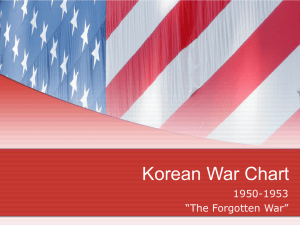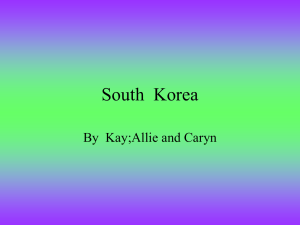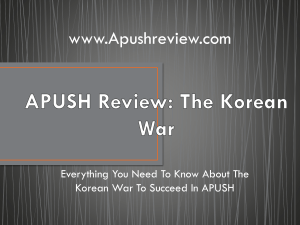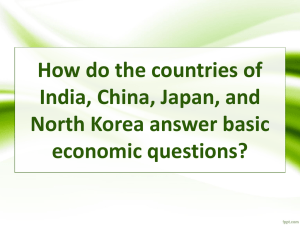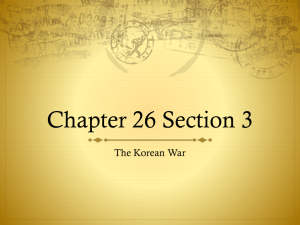St. Paul`s Mini-MUN.Historical Security.Korean War
advertisement
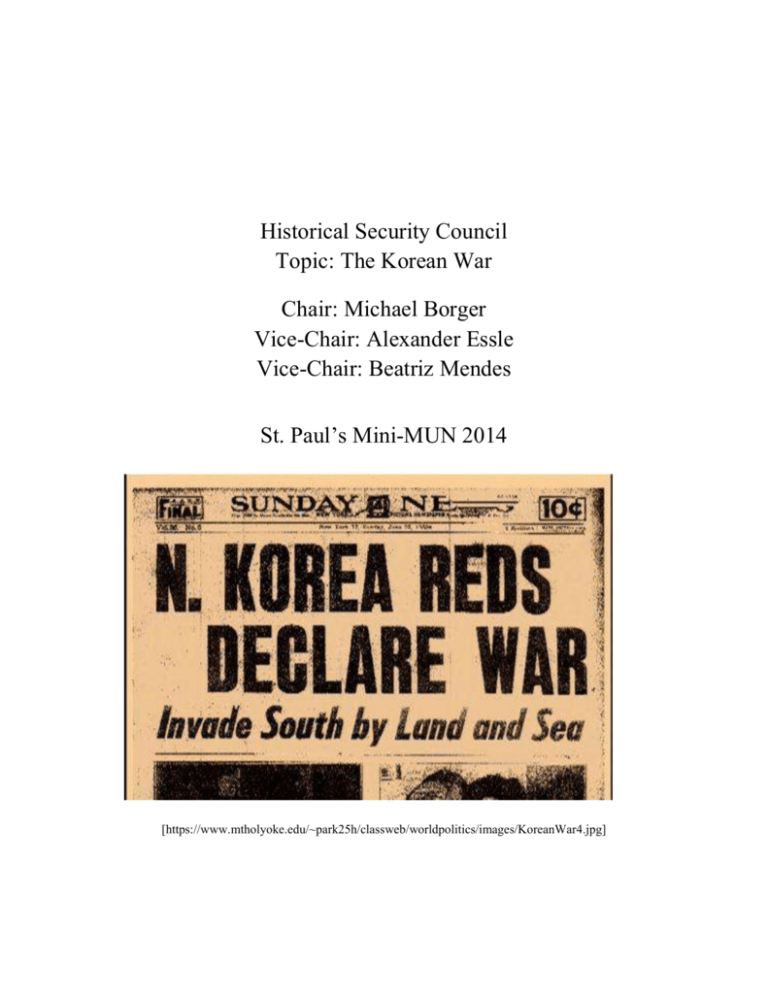
Historical Security Council Topic: The Korean War Chair: Michael Borger Vice-Chair: Alexander Essle Vice-Chair: Beatriz Mendes St. Paul’s Mini-MUN 2014 [https://www.mtholyoke.edu/~park25h/classweb/worldpolitics/images/KoreanWar4.jpg] Table of Contents Introduction to Committee……………………....…….………..1 Basic Summary of the War and its Precursors……………….....2 Key Terms………………………………………………….…...3 Timeline………………………………………………….……..4 Debating Suggestions………………………………….………..6 Position Paper…………………………………………………..7 Guiding Questions………………….....………………………..8 Further Research………………………………………………..9 Introduction to Committee: Topic: The Korean War Delegates Present: The United States, The Soviet Union, France, China, North Korea, South Korea, Japan, Australia, Brazil, Mexico, Saudi Arabia Date the Committee is Taking Place: June 24, 1950 “The Korean War began on June 25, 1950 and ended on July 27, 1957. As one of the bloodiest wars in the twentieth century, the Korean War has been long considered a proxy conflict between the United States and the Union of Soviet Socialist Republics (USSR) where two political ideologies, democracy and communism, clashed for predominance within the international community. Occurring a few years after the end of World War II, the war highlighted not only WWII's catastrophic effects on the international system, but also augured and consolidated the tension between the US and the USSR. With both these states on opposite poles of the bipolar international system, the remaining states had to choose sides and strategically forge alliances with other states. In the process, however, these states created dangerous enemies,” [committee description]. Image Source: [http://upload.wikimedia.org/wikipedia/commons/4/4e/KoreanWar_recover_Seoul.jpg] Basic Summary The Korean War was the first clash in the Cold War, which was a conflict spanning decades between the United States (capitalism) and the Union of Soviet Socialist Republics (communism)1. It also happened to be the first UN-sanctioned war, meaning the United Nations got involved after it decided that North Korea’s invasion of South Korea was a breach of international sovereignty laws as delineated in the UN Charter’s Chapter 1, Article 22. This war saw the United States and its allies, including South Korea, the United Kingdom, and ultimately the UN, fight against the USSR and its allies, including North Korea and China. In this war, the US introduced its containment policy to stop the spread of communism while the USSR continued trying to disseminate its political ideology further into neighboring or nearby countries. Since it was a political war, the Soviet Union and the US attempted to compromise often, but talks, like the confrontations on the battlefields, usually ended in stalemates. Because this committee happens the day before the war starts, it is important to understand the precursors for the invasion. Korea was ruled by Japan from 1910 until the end of World War II. Then, the Soviet Union took over the peninsula north of 38° latitude and the US the south. By 1948, two disparate governments had been established: one by the US/South Korea and the other by the USSR/North Korea. Neither government respected the other nor the other’s implicit territorial jurisdictions or borders, so the North Korean forces, supported by the Soviets and Chinese, invaded South Korea on June 25, 1950 by crossing the 38° latitudinal line. That day, the UN called for a ceasefire after agreeing North Korea’s action was an invasion. However, North Korea refused to halt its progression into South Korea, so on June 27, the UN Security Council adopted S/RES/83: complaint of aggression upon the Republic of Korea and sent UN Forces to Korea. 1 2 George Washington University [http://www.gwu.edu/~erpapers/teachinger/glossary/korean-war.cfm] United Nations’ Charter [http://www.un.org/en/documents/charter/chapter1.shtml] Key Terms Capitalism: a type of economic and political system where a country’s trade and industry are run by private owners for profit rather than by the state; the market controls the economy. Communism: a type of economic and political system where property is publicly owned; each person works and is paid according to their merit and needs; government typically controls the economy. Containment: a policy used by the US to prevent the spread of communism overseas. This policy was a response to a series of moves by the Soviet Union to enlarge their influence in Eastern Europe, China, Korea, Africa, and Vietnam. The United Nations Charter: A 19-chapter legal document that all UN member-states, and even states or nations that have not agreed to it, must abide by, or they theoretically face severe repercussions. As one of the only international binding documents all states must follow, it details what each state is allowed to and prohibited to do domestically and abroad. World War II: A global war that lasted between 1939 and 1945 where the Axis (Nazi Germany, Italy, and Japan) fought against the Allies (the US, the UK, the USSR, China, and France). The war saw millions of deaths, approximately 50 to 85 million casualties. WWII also included the Holocaust, a mass persecution of Jews within Nazi territory, where many Jews were sent to concentration camps and around 6 million were killed. The “winners” of the war, the Allies, established the United Nations after the war ended, and they became the five permanent veto powers in the Security Council. Cold War: A decade-longs conflict of political and military tension after WWII between the Western Bloc (the US, its NATO allies, and others) and the Eastern Bloc (the USSR and its allies from the Warsaw Pact). Most of the military conflicts resulting in death happened in foreign lands where the country would be divided between the Soviet Union and the US. The wars fought on foreign soil were called “proxy wars,” or wars incited by major powers that were not directly involved in them. 38° Latitudinal Line/38° Parallel: A line passing through 38° latitude. It separated the Korean peninsula into North and South Korea. The Korean War started when North Korean troops crossed this line. S/RES/83: complaint of aggression upon the Republic of Korea: A resolution adopted by the United Nations Security Council (UNSC) that stated North Korea had invaded South Korea and consequently breached peace. It called for an immediate ceasefire and for the North Korean authorities to withdraw their forces. Additionally, it stated that because North Korea failed to follow Resolution 82, which stated North Korea must remove its troops from South Korean soil, the UN would have to take further interventionist actions, including sending official troops to Korea, to restore international peace and security in the region. Timeline (up to the committee date) ❖ 1894-1895: Sino-Japanese War (war between Japan and China) ❖ February 1904: Russo-Japanese War begins (war between Russia and Japan) ❖ September 1905: Treaty of Portsmouth (ends Russo-Japanese War) ❖ 1905: Japan makes Korea a protectorate (a state controlled by another state) ❖ 1910: Japan makes Korea a formal colony ❖ 1917: Russian Revolution; Japanese take some of Russian territory in Eastern Siberia ❖ 1931-1932: Japan’s Kwantung Army occupies Chinese Manchuria and creates a puppet state of “Manchuko;” the US does not like this and wants to return Manchuria to China ❖ 1937: Japan declares war on China ❖ 1939: World War II begins ❖ 1945: World War II ends; the Allies win ➢ July: Potsdam Conference – the US and the USSR make plans to joinly occupy Korea after Japan’s defeat. the USSR will get the North and the US will get the South. ➢ August 10: Russian troops enter Korea ➢ August 15: Japan surrenders in World War II. ➢ August 26: Russia stops at the 38° Parallel ➢ September 9: the US arrive in Seoul and accept Japan’s surrender. ❖ March 5, 1946: Winston Churchill gives “Iron Curtain” speech; Iron Curtain = the curtain of communism or Moscow influence over the USSR’s neighboring states ❖ March 12, 1947: Truman Doctrine; Truman says the US will assist any country threatened by communism, starting the US’s containment policy. ❖ September 1947: UN passes American resolution calling for free elections in Korea; the US plans to withdraw from Korea, hoping to leave the South as an independent state under Dr. Syngman Rhee, a pro-American conservative. ❖ May 10, 1948: Korean Election Day; Syngman Rhee elected, although many boycotted the election. ❖ June 24, 1948: Berlin Blockade begins; the Soviet Union blocks the Western allies’ roadways, canals, and roads’ paths to areas of Berlin under allied control ❖ August 1948: Syngman Rhee declares the independence of the Republic of Korea; does not recognize North Korea and instead, claims all of the Korean Peninsula ❖ September 9, 1948: Democratic People’s Republic of Korea (DPRK)/North Korea proclaimed ❖ April 4, 1949: NATO (North Atlantic Treaty Organization) Pact signed ❖ September 1949: “Joe One” – Soviets test their first Atomic Bomb; start of the arms race ❖ October 2, 1949: Mao Zedong proclaims PRC (People’s Republic of China) ❖ January 12, 1950: Secretary of State Dean Acheson says the US Will fight to defend all territory within its “defensive perimeter,” in which he includes Japan and the Philippines, but not Korea. Josef Stalin, the Soviet leader, misinterprets this speech as saying there will be little risk of American retaliation if North Korea invades the South. ❖ March, 1950: When Kim-il Sung (North Korean leader) goes to Moscow, Stalin approves North Korean invasion of South Korea, thinking the US is uninterested in Korea. ❖ May 30, 1950: South Korean elections. ❖ June 25, 1950: North Korea crosses the 38° Parallel, invading South Korea. Sources for Timeline: http://www.sparknotes.com/history/american/koreanwar/timeline.html http://www.shmoop.com/korean-war/timeline.html Debating Suggestions Any information presented by delegates about events taking place after June 24, 1950 will be disregarded. However, there are different ways delegates can skillfully incorporate some events that took place afterwards including through: ➢ Discussing possible threats, rumors, and suspicions about or from other countries (ie. “China might be inclined to ally itself with the USSR if we don’t take appropriate action now”) ➢ Asking questions asking “doesn’t the delegate think (insert blank) might happen?” ○ Might be obnoxious and disregarded by the chairs depending on how blatant it is ➢ Predicting future events that actually happened or not (ie. “The USA and the USSR might use another country as a battleground for their ideological war, especially less-developed states like Vietnam, for instance.” ○ Be careful with overusing this as it might be conveyed as an unconvincing slippery slope argument ➢ Foreboding future problems for the United Nations if it does not tackle it now (“The UN might not get involved in future conflicts if it doesn’t intervene in this war because it’d be setting a horrible precedent for itself.”) ➢ Generating hypothetical scenarios ○ Can be extremely effective or ineffective depending on how they are used ■ Ineffective: (“If the UN doesn’t get involved, then 300,000 people are going to die during the war.”) ● How do you know that? That seems to be a random number, considering the war hasn’t even started yet ■ Effective: (“The UN should get involved in the current conflict (see how ‘war’ was replaced here) to ease tension between the two states. If the UN does not get involved, it seems that the two states will continue to have a strained relationship, leading most likely to the political isolation of one or the other if the bipolar international system collapses into a unipolar system with either the US or the USSR in the center.”) ● Notice how the hypothetical here was used to depict the possibility that the UN’s idleness will lead to strained relationships between the two states in a supposedly future unipolar situation. Nowadays, that is of course the case, since the US is at the center and South and North Korea are hostile towards one another. Position Papers For this committee, we are expecting brief position papers. They should be turned in to the chairs by Monday, December 1 by 11:59 p.m. Please email them to the email attached here. Position papers should possess the following (the word counts indicated in “max” are recommendations, not guidelines): ● In the top-left corner: delegate’s name, email, state represented, committee name, advisor’s name, school ○ Ex. John Smith, gr358454@graded.br China–Historical Security Council Ms. Baumgarten, Graded ● A short introduction to the topic (what do you know about it? history? context?) – max: 100 words ● Country’s overall position (what does your country believe? what’s its opinion on past events?) – max: 100 words ● Ideal solution (what does your country want?) – max: 100 words ● Pragmatic resolution ideas (what will your country do in the committee? What will it propose?) – max: 120 words ● Country’s allies (what countries represented in the committee does your country agree with generally? On what?) – 80 words ● Country’s enemies (what countries represented in the committee does your country disagree with? On what?) – 80 words Position papers should be no longer than 600 words in total. Guiding Questions 1. What is the role the UNSC should take in addressing the Korean War (ie. passive, neutral, active, hostile, etc.)? 2. How should the UNSC respond to the US and Russia’s alliances with opposite belligerents of the war? 3. Does being a proxy war make this conflict different from others and does this alter how the UNSC should address the conflict? 4. Knowing that the date on which the committee is taking place was before the war started, are there any differences in how delegates should approach the topics? Should they try to compromise and negotiate before immediately invading, like the United Nations did on June 25, or taking other interventionist measures? 5. Are there sovereignty issues that need to be considered? What about international laws? 6. Are people’s human rights being violated and if so, what course of action should the UNSC take to amend the situation? 7. Does political ideology justify killings when intended to thwart an alternate political framework from spreading? Think “communism versus democracy” and whether either, neither, or both sides have adequate rationales. Further Research Summaries of the war: ● http://www.gwu.edu/~erpapers/teachinger/glossary/korean-war.cfm ● http://en.wikipedia.org/wiki/Korean_War - yes, we know, but it’s pretty useful ● http://www.cotf.edu/ete/modules/korea/kwar.html Harbingers of the the War: ● http://www.shmoop.com/korean-war/timeline.html ● http://www.history.navy.mil/photos/events/kowar/prelim.htm ● http://totallyhistory.com/us-history/korean-war/ Image Source: [http://usarmy.vo.llnwd.net/e2/c/images/2012/07/23/257145/size0.jpg] Excited to work with you all! Your chairs, Michael Borger, Alexander Essle, & Beatriz Mendes





